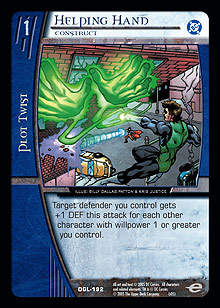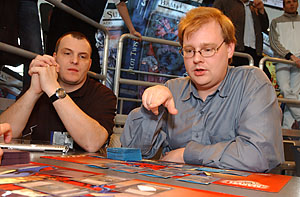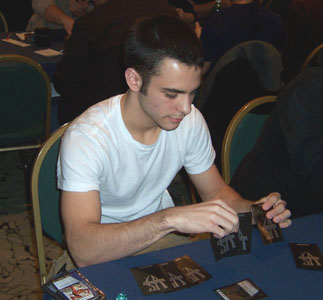I fear that the next couple weeks of Two Turns Ahead are going to be even further ahead for me than they are for you, dear reader. Through a combination of Pro Circuits and major national holidays (not celebrated in England, I might add), both this article and its successor will have been penned well prior to the Pro Circuit in LA. If I want to be topical and up to the minute in my insightful ruminations, then I will rather have to turn to powers of precognition that I haven’t displayed thus far.
If ever there were a time when I needed my mutant power to kick in, it is now.
There are quite a lot of mutant powers that I could happily live with having. The top of my list would have to be teleportation. While I love all the travel inherent to being a Pro Circuit reporter and occasional player, I loathe the physical act of getting from point A to point B. Until the airlines of the world get their acts together and arrange the seating on their flights into “young, free, and single/not” rather than “window/aisle,” I cannot see my opinion changing any time soon. If I were ever able to remove the need to worry about the distance between point A and point B, then my life would be inordinately easier. I think that if I had X-ray vision or the ability to read minds, I would likely get myself into all sorts of crazy japes, many of which would be inspired by assorted teen films and almost certainly have some sort of pop-punk soundtrack. I don’t think that this would be good for my character overall, though. I will pass on having a mutant healing factor, also. I think this would just encourage me to put myself into positions of immediate danger. While my body might be able to cope with this, I’m not sure that my mind or my laundry budget could adjust.
The one other mutant power that intrigues me is precognition. Imagine being able to know what would happen even five seconds into the future. All of a sudden, you would have absurdly quick reactions and a much better chance at appearing to have a sharp wit. I like the sound of this already. Extend that five second bubble to five minutes, hours, or days, and you don’t need to be especially super in any other way at all to be a bona fide superhero.
Predicting metagames is about as close as I ever realistically get to seeing into the future. The metagame (and by that, I’m talking about picking the right deck, not about the website that you are reading now) and the ability to read it well plays an absolutely crucial role in your success in big events, or as it is sometimes referred to, your “expected value.” Essentially, expected value takes the potential benefits or prizes that come from a successful result in a risky situation and divides them by your chances of a win actually happening. If the resulting number is higher than the cost of entering into your risky situation, then it is mathematically worth it. So, if the entry to a tournament with a $100 prize is $10, and you have 10 players of identical ability, your expected value is $10. This is the same amount it costs you to enter, and that’s without taking into account the cost of your time and other non-monetary resources. If you had some sort of an advantage against the field, though, it would immediately look like a good undertaking from a purely financial standpoint.
Good metagame calls effectively give you more of an edge against the field in the same way that improving your play skill does, and in some instances, they allow you to get more advantage than you could possibly expect from the same amount of effort in the short term from practicing. Playing the metagame well is most definitely a +EV activity!
Tools like Metagame.com are great for getting a feel for what to expect at tournaments of all levels. Like it or not, people tend to gravitate toward playing decks with proven success in previous events of the same format, and this site is a great place to find out what those decks are. In most teams’ preparation for PC LA, I would expect there to be quite a bit of careful observation of what has been going on in recent Golden Age $10K events. If you know that the majority of players favor, for example, Avengers, that should inform your deck decision.
 Where things become interesting is when information is muddled or unclear. For example, for PC Indianapolis 2005, there hadn’t been much in the way of open information about preparation for the DC Modern Age format. By necessity, testing occurred somewhat in the dark. If one team had decklists in their test gauntlet of differing power levels than most of the rest of the field, this could in turn lead to some unusual metagame decisions. Team YMG/Kings Games elected to drop Helping Hand from their GLEE list, as they found that it was relatively straightforward to play around by utilizing appropriate attack orders. What they perhaps failed to anticipate for PC Indianapolis, though, was the fact that the level of play with GLEE at the event didn’t necessarily make Helping Hand as dead as they had thought. FTN, meanwhile, elected to play the powerful defensive twist, rightly reasoning that there would be occasions where its value would shoot up against players who had failed to factor it into their testing.
Where things become interesting is when information is muddled or unclear. For example, for PC Indianapolis 2005, there hadn’t been much in the way of open information about preparation for the DC Modern Age format. By necessity, testing occurred somewhat in the dark. If one team had decklists in their test gauntlet of differing power levels than most of the rest of the field, this could in turn lead to some unusual metagame decisions. Team YMG/Kings Games elected to drop Helping Hand from their GLEE list, as they found that it was relatively straightforward to play around by utilizing appropriate attack orders. What they perhaps failed to anticipate for PC Indianapolis, though, was the fact that the level of play with GLEE at the event didn’t necessarily make Helping Hand as dead as they had thought. FTN, meanwhile, elected to play the powerful defensive twist, rightly reasoning that there would be occasions where its value would shoot up against players who had failed to factor it into their testing.
 There are occasions when identifying the most commonly played deck types won’t simply be a question of working out which is the “best deck.” There have been a couple of occasions where, in my opinion, the most powerful deck that would be represented at a Golden Age tournament would be Dean Sohnle’s Fantastic Fun. However, it would have been a negative EV action for me to tweak my deck so that I could beat Dean more easily. Fantastic Fun hasn’t ever fallen into widespread favor, possibly because of how complicated it can be to play. If Dean is the only player likely to run the deck at an event, and the value I gain from changing my matchup against him is lower than the value I lose by changing every other matchup, then it would not be a good plan at all.
There are occasions when identifying the most commonly played deck types won’t simply be a question of working out which is the “best deck.” There have been a couple of occasions where, in my opinion, the most powerful deck that would be represented at a Golden Age tournament would be Dean Sohnle’s Fantastic Fun. However, it would have been a negative EV action for me to tweak my deck so that I could beat Dean more easily. Fantastic Fun hasn’t ever fallen into widespread favor, possibly because of how complicated it can be to play. If Dean is the only player likely to run the deck at an event, and the value I gain from changing my matchup against him is lower than the value I lose by changing every other matchup, then it would not be a good plan at all.
There tends to be a bias at the PCQ level toward two main things. Firstly, we see a lot of whichever deck is the right combination of powerful and “straightforward to play.” In recent times, this was Sentinels, but it is looking increasingly likely to be Avengers for some time to come. The second factor is the “cool effect.” There are various players who just love to do cool things to win games. I must confess that on occasion, I have been guilty of this, and it will likely be a trend that continues in the future (just wait until you see next week’s article). It isn’t necessarily as important to metagame around the “fun” decks as it is for the very powerful ones, but depending on matchups, it is definitely not a good idea to ignore the deck that might see a temporary spike in popularity after a big event. If in doubt, try to gauge the unusual decks’ overall power levels, then assume that there will be a few more people playing the wackier decks than their power levels really warrant.
At higher level tournaments, raw power level tends to be more significant than how difficult a deck is to play, but simplicity will still be a factor on occasion. Less complicated decisions mean less things to go wrong, and at high levels, making mistakes can really take the wind out of one’s sails.
There tend to be more clever decks designed to exploit holes in the metagame at Pro Circuit–level events. Part of this is a function of the fact that top teams will save their absolute best decks for the PC. Jason Hager’s New School build and the Xavier’s Dream deck of Michael Barnes were both great examples of very good deck choices for a (pretty predictable) Sentinels-heavy metagame at PC New York.
 For PC LA, deck choices are quite a lot more complicated. There doesn’t immediately appear to be an unquestionably “best” deck that would make it a +EV activity to build decks specifically to smash it. Instead, it seems likely that the best metagame decks for LA will be the ones that correctly anticipate the weakest level of resistance to their win condition. Tim Batow scored some success with Rigged Elections at a $10K largely by virtue of recognizing that there wasn’t a great deal of Doom in the (then Sentinels-heavy) metagame. For LA, finding the right gap might well be a sound plan for finding success. Alternatively, there is the standard “pick the most consistent deck that has an immediately high power level and hope people have outthought themselves” option.
For PC LA, deck choices are quite a lot more complicated. There doesn’t immediately appear to be an unquestionably “best” deck that would make it a +EV activity to build decks specifically to smash it. Instead, it seems likely that the best metagame decks for LA will be the ones that correctly anticipate the weakest level of resistance to their win condition. Tim Batow scored some success with Rigged Elections at a $10K largely by virtue of recognizing that there wasn’t a great deal of Doom in the (then Sentinels-heavy) metagame. For LA, finding the right gap might well be a sound plan for finding success. Alternatively, there is the standard “pick the most consistent deck that has an immediately high power level and hope people have outthought themselves” option.
I feel confident that in the coverage of LA (which should be up any time now), we will see plenty of both.
Have fun and be lucky,
Tim “Worldwide Champion” Willoughby
timwilloughby@hotmail.com